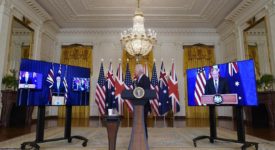Brussels welcomed a team of U.S. negotiators of the Transatlantic Trade and Investment Partnership (TTIP) yesterday (2 February), who are readying to launch another round of negotiations with their European counterparts on the world’s biggest-ever free trade agreement. The trade deal would link the 28 countries of the European Union with the United States, which would create a market of roughly 850 million people. TTIP, despite the fact that it has already been negotiated for two years, is still being bogged down by public opposition on both sides of the Atlantic. The future of the deal remains insecure as activists and some European governments send mixed signals. Some anti-TTIP groups have even called the agreement “the dirtiest trade deal in Europe’s history”.
Among the most controversial parts of the deal are plans to let firms have legal disputes with government heard by supra-national courts and tribunals if firms feel that local laws violate the trade deal and threaten their investment. Critics, however, expect this Investor-State Dispute Settlement (ISDS) would favour companies and undermine national sovereignty. Yesterday was the first day of the four-day-long negotiations which will be the first since the new European Commission led by Jean-Claude Juncker took office in the autumn last year. The new trade commissioner, Sweden’s Cecilia Malmstroem, is believed to encourage and salvage the negotiations by bringing some fresh air to the talks.
The ambitious deal would be indeed very unique in history, analysts agree. The deal is expected to decrease trade tariffs even lower and harmonize regulations across different industries including foods, services, accounting, and investment. “We are dealing mainly with regulation and more specifically, de-regulation,” Tom Jenkins of a European trade union group commented.







